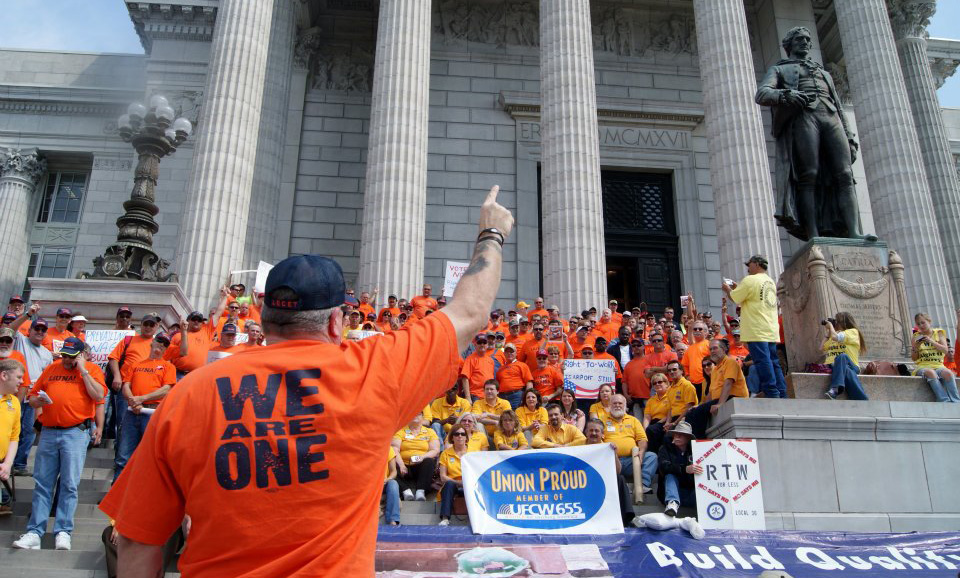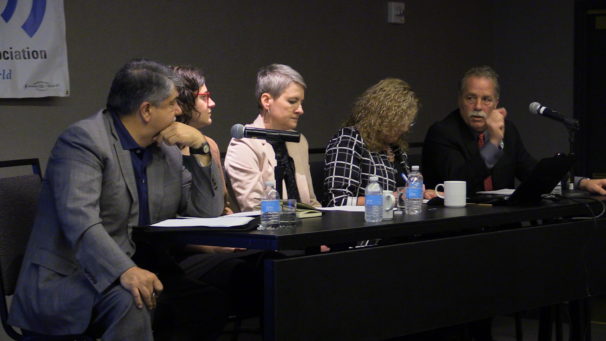
ST. LOUIS—What’s going to happen when the Supreme Court rules, next June or maybe some time before, that “right to work” laws that already obtain in more than half the states, are now the law of the land? If the justices rule against labor in the Janus case, that could be the case for millions of workers in the public sector across the country.
Right to work is the principle that non-union members need not contribute to the union that, in fact, represents them even if they do not choose to pay dues. When right to work was imposed in Wisconsin a few years back, only one-tenth of the then unionized public employees in the state stayed on as dues-paying members. The other ninety percent, now “free” of the burden of paying dues and ignoring the invaluable union protection they were giving up, deserted the movement.
That was the desired effect by Gov. Scott Walker and his far-right political allies. Deprive the labor movement of its financial resources and starve the unions to death. The single greatest progressive contributor and influence in the electoral arena—poof! Gone overnight.
Without those resources, the union movement was unable to mount a winning campaign for the Democratic candidate for president in Wisconsin—and of course there was massive gerrymandering and voter disenfranchisement as well. So ingrained was the perception of Wisconsin as solidly blue territory, at least in presidential elections, that Hillary Clinton failed to visit the state even once during her campaign. Trump squeaked by with the narrowest of wins, enough to garner Wisconsin’s electoral college votes. With right to work installed everywhere, conservatives can envision themselves ruling for an infinitely foreseeable future.
The Missouri experience
At the International Labor Communications Association convention here in St. Louis, a Friday morning panel (Oct. 20) titled “Confronting Right to Work and Building a Workers’ Movement” addressed various aspects of the political crisis coming down the pike with the forthcoming Supreme Court decision. With the Trump-appointed Neil Gorsuch now on the Court, the vote in the Janus case is anticipated to be 5-4 for national right to work.
Moderated by President Richard Trumka of the AFL-CIO, the panel included David Cook, president of the United Food and Commercial Workers (UFCW) Local 655 in St. Louis; Nora Loreto, representing the Canadian Association of Labour Media; MaryBe McMillan, president of the North Carolina AFL-CIO; and Megan Parke, director of field services for AFSCME Council 28 in Washington state.
Let’s focus here on David Cook’s experience helping to organize a successful petition campaign to put a statewide people’s veto referendum on right to work on the November 2018 ballot.
Cook serves on the executive council of We Are Missouri, or We Are MO, a coalition of Missouri citizens dedicated to stopping right to work from becoming law. “There is an army of people in Missouri who have said this is the time for this fight,” Cook said. He helped to found a group called Preserve Middle Class America (PMCA) to broaden the appeal on the right to work issue.
Cook was instrumental in developing a message that could unite different unions with sometimes divergent interests. Operating Engineers, the UFCW, Building Trades workers, and Carpenters, for example, often have disagreements over other issues like jurisdiction and prevailing wages. But ever since the first day they started meeting together, he said, “We have only talked about right to work. Now we have a partnership between PMCA, AFL-CIO, and the Carpenters. If we can get our crap together and stop fighting among ourselves, then the messaging is easy.”
And what is the message? “Who wants to work for less money? Nobody. Who deserves to work for less money? Nobody.” Then, catching himself, Cook said, “Except maybe those people on Wall Street.”
Six years ago, Cook related, about 25 percent of Missourians were opposed to right to work, and some 42 percent were in favor. “It was a horrific learning process as we gathered this data,” Cook recalled, as they faced the perplexing question of how so many people could be against their own best interests.
The diligent data collectors found, somewhat contrary to intuition, that small-business owners were among the most effective and trusted speakers against right to work in the eyes of the general public. Their feeling was that they didn’t want big government interfering with their right to run their businesses as they saw fit, and in many cases small businesspeople actually had no problem with unions. We Are MO recruited some of them as spokespersons for the anti-right to work campaign.
Missouri has eight Congressional districts, and on Friday, August 18th, We Are MO made history by submitting 310,567 signatures to the Missouri Secretary of State, exceeding the required number of signatures in each district, to give Missouri voters, not the politicians, the right to determine the economic future of working people in the state.
“Today,” said Cook, “Missouri is possibly the only state in which right to work polls the right way. About 50 percent of people are against right to work before you even say a word.”
Losing members to the Republicans
Missouri is known as the “Show Me” state—people who live by evident, palpable facts. In that spirit, Cook said, “We have to face the fact that we have lost a chunk of our members to the Republicans. Through their messaging, they have been effective at stealing our members. And we know we may never get some of them back.

“But,” he continued in a way that may be a critical lesson for the rest of the labor movement, “we found that if we can’t get them out of Republican ranks, then we at least have to influence which Republicans they are electing. We need to have them meeting with their representatives at Hardee’s and saying, ‘You may be a Republican and I voted for you because I’m a Republican, but I didn’t vote for you to bring in right to work.’ Today, we have a block of Republicans who will not vote for anti-labor measures because our Republican members are influencing them.”
On the other side of the aisle, Cook cited Democrats who vote the right way, but they don’t exactly know why. With the help of Ed Finkelstein, publisher of the St. Louis/Southern Illinois Labor Tribune, the anti-right to work campaign researched and produced a series of booklets with the facts. “Right to Work States vs. Free States” was one, recalling the metaphor of slavery in the pre-Civil War period. Another was modified to provide moral resources and guidance to members of faith communities around the state. And yet another version was directed specifically at union members.
Cook anticipates that the referendum against right to work will win in November 2018, although there is a chance that the legislature may move the vote to August in an attempt to depress the vote. In that case, Cook said, “then we know they are petrified of us. If it stays in November, which I’d prefer, then we will beat it and take some of them out.
“Make no bones about it, there is only one labor fight in 2018. It’s in Missouri. Trust me, this is where we turn the tide. It’s the first time in a long time where we’ve had the chance to win one of these ground fights on labor’s issues.”
The facts on right to work
Before opening the session up to a Q&A from the audience, moderator Trumka posed his own question to David Cook: “You said there are a lot of facts about right to work. Why don’t you give us a few?”
“The most effective message we had in metro areas,” Cook replied, “was about the attack on workers and lowering wages. If you pass it, wages for all workers go down.” He revealed a little messaging tip: “You say dues, you lose. We never mentioned unions.”
In rural areas, Cook continued, “it was about government overreach. Here, it was about saying government shouldn’t be able to tell small business how it should relate to its workers. We also talked about higher childhood mortality in right to work states, and income difference. On average, in a right to work state, the median income is $8000 less,” or $681 less per month, according to the U.S. Census Bureau.
In addition, workplace injuries and deaths increase by 49 percent in right to work states, according to the Bureau of Labor Statistics. The union is simply not there to negotiate safe working conditions. In right to work states, health insurance is more vulnerable to CEOs raising costs or cutting coverage. And right to work laws make it easier for corporations to ship American jobs overseas, jobs that will never be replaced at home.
Now from the audience came the $64 question: “What will happen if SCOTUS rules against labor in the Janus case? What will you do with this great in-state campaign if nationally things go south?”
“This partnership will be united from now until forever,” Cook replied. “We also had a rule that once we had this data, once we had these materials, it was free to everyone.” The struggle to organize, now armed with an arsenal of facts, will go on.
Concluding this part of the panel, Richard Trumka said, “Janus will affect public unions. But right to work will affect every union public and private. We have started conversations with our members, finding out what they need. To be honest, we have taken many of our members for granted. It’s up to each individual union to have a conversation with their members. It strengthens that relationship. When Janus comes down, it will have far less effect than if we just sat back and waited for it.”
C.J. Atkins contributed to this article.












Comments